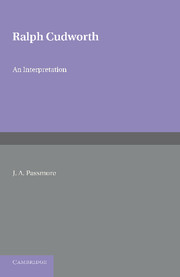Book contents
- Frontmatter
- Contents
- Preface
- Abbreviations
- CHAPTER I Cudworth and his Predecessors
- CHAPTER II Cudworth on Mind and Nature
- CHAPTER III Cudworth's Theory of Knowledge
- CHAPTER IV ‘Eternal and Immutable Morality’
- CHAPTER V Cudworth's Moral Psychology
- CHAPTER VI The Good Life
- CHAPTER VII Ethics and Religion
- CHAPTER VIII Cudworth and the British Moralists
- Appendix: The Cudworth Manuscripts
- A Cudworth Bibliography
- Index of Names
CHAPTER VIII - Cudworth and the British Moralists
Published online by Cambridge University Press: 05 June 2016
- Frontmatter
- Contents
- Preface
- Abbreviations
- CHAPTER I Cudworth and his Predecessors
- CHAPTER II Cudworth on Mind and Nature
- CHAPTER III Cudworth's Theory of Knowledge
- CHAPTER IV ‘Eternal and Immutable Morality’
- CHAPTER V Cudworth's Moral Psychology
- CHAPTER VI The Good Life
- CHAPTER VII Ethics and Religion
- CHAPTER VIII Cudworth and the British Moralists
- Appendix: The Cudworth Manuscripts
- A Cudworth Bibliography
- Index of Names
Summary
It is always difficult to assess the influence of a seventeenth-century writer upon his immediate successors. At no time has the custom of acknowledging indebtedness been so lightly regarded. In reaction, perhaps, from the obsessive deference to authority which was as characteristic of Renaissance humanism as it was of medieval scholasticism, men minimized the extent of a learning of which they would previously have been glad to boast. The difficulties in the case of Cudworth, even then, are peculiarly great. For one thing, he wrote as a member of a school. Much that his successors could have learnt from Cudworth might equally derive from Whichcote or from More, to say nothing of the lesser lights; and, as we have already noted, it is impossible to be sure, on a particular point, which of the younger members of the school was the originator, and which the disciple. Or perhaps Plato, or Aristotle, or Clement of Alexandria, or St John taught their successors the lesson which the Cambridge Platonists also elaborated; perhaps the teacher will be Limborch (with whom both Cudworth and Locke were closely associated), perhaps some English Arminian or latitudinarian, perhaps a Renaissance humanist. The idea of'toleration', for example, was so much ‘in the air’ that it would be rash to argue that Locke must have learnt from the Cambridge Platonists to appreciate its virtues. And, a point easily overlooked, one must take into account the continuing influence of scholasticism, an influence rarely admitted although by no means negligible.
To make matters worse, only The True Intellectual System, of Cudworth's major work, was published in his life-time, and even that did not appear until 1678. Eternal and Immutable Morality was not published until 1731, twenty-five years after Clarke's Boyle lectures. Yet Cudworth taught, almost for his life-time, at Cambridge, and we know that he was an unusually popular teacher; he wrote at a time when the passing around of manuscripts was still a quite normal method of philosophical communication; he had a daughter who was a zealous defender of her father's memory; and this same zeal descended even to a second generation, for it was through the efforts of his grandson that Eternal and Immutable Morality first appeared in print.
The difficulties one has in determining the exact influence which Cudworth exerted on Locke's Essay will serve to illustrate the general problem.
- Type
- Chapter
- Information
- Ralph Cudworth , pp. 90 - 106Publisher: Cambridge University PressPrint publication year: 2013

